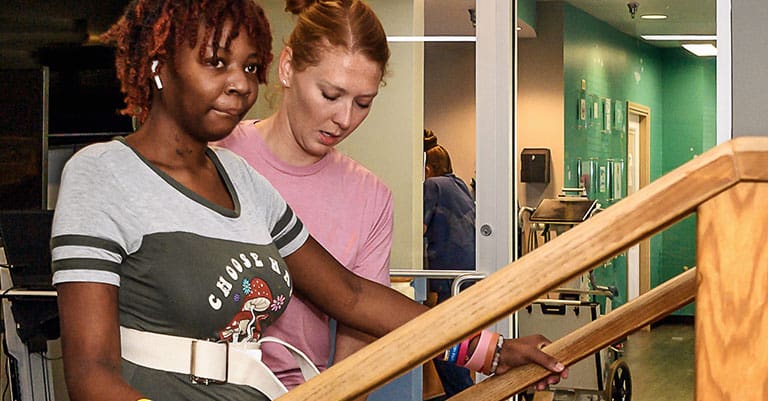Urinary and bowel control issues occur when there is a disruption in information communicated between the brain and the areas of the body that control bladder and bowel function. These control mechanisms can cease to function initially due to acute inflammation of the brain in brain injury patients and more permanently in spinal cord injury patients.
“Treatment plans for children with bladder and bowel dysfunction vary case by case, often depending on the etiology of the dysfunction and the developmental age of the patient,” explained Courtney Toomey, M.D., Director of Rehabilitation and Director of Brain Injury Programming at Nexus Children’s Hospital. “It’s something that’s usually seen acutely in severe brain injury cases and in patients with spinal cord injuries.”
Bladder and Bowel Incontinence in Severe Brain-Injured Patients
Children who arrive at Nexus Children’s Hospital soon after experiencing a severe brain injury remain with significant inflammation in the brain. Many of these children are in a state called a disorder of consciousness (DOC), the hallmark of which is intermittent responses to their environment. “Since the brain is the captain of the ship,” said Dr. Toomey, “it can be difficult for it to coordinate the urination or bowel movement process when it’s extremely inflamed and offline, so to speak.”
This acute process often causes the body to retain urine, and intermittent catheterization is required to empty the bladder and prevent urinary tract infections. The bowels are often inefficient with their motility as well. Early severe brain-injured patients are at risk for constipation and vomiting without the correct bowel regimen and formula. “With progress from the initial injury and a decrease in brain inflammation,” explained Dr. Toomey, “this type of neurogenic bowel and bladder will resolve.”
Neurogenic Bladder and Bowel in Patients with Spinal Cord Injuries
Spinal cord injuries present a different problem, in that their effects are often permanent. “In order to volitionally initiate urinating or having a bowel movement,” Dr. Toomey explains, “different nerves and neurotransmitters have to coordinate with each other with extreme synchrony.” A spinal cord injury interrupts the electrical highway of sensory and motor information required for this communication, much like causing a permanent roadblock on a highway would prevent cars from moving in either direction. This leaves spinal cord patients with the inability to control their bladder or bowel function.
Nexus Children’s Hospital’s interdisciplinary care team works with these patients on bladder and bowel management in preparation for them to return to lives of independence. “Patients with injuries that still allow them the majority of the use of their arms and hands can be taught to independently develop methods that give them more control over these bodily functions,” Dr. Toomey said. “This allows them to be more present in everyday life activities without fear of embarrassment from an unplanned accident.”
“A vital part of this training,” she continued, “is teaching the patient how to transfer to a commode and utilizing gravity to aid in a bowel movement.” Medications like stool softeners, bowel stimulants, and suppositories can be used to augment control of when to have a bowel movement. Although hard to discuss, these patients rely on digital stimulation to activate this process, which Dr. Toomey likens to the lever of the toilet handle in creating the bowel movement.
Patients will also be taught how to perform self-catheterizations to empty their bladders, again decreasing risks of bladder infections and protecting the health of their kidneys. There are even tiny catheters without collection bags that can be used to open the urethral sphincter to eliminate urine directly into the commode for discretional use in public bathrooms.
Dr. Toomey explains that neurogenic bowel and bladder treatment is an essential and basic pillar of spinal cord rehabilitation, often because control of these bodily functions have such a significant impact on a patient’s self-esteem. “Assisting these patients and providing a care plan for neurogenic bladder and bowel greatly improves their functional independence and self-worth. It allows people to spend time with their family and friends without fear of embarrassment. It’s a significant quality of life improvement for them.”
To learn more about the rehabilitation services offered at Nexus Children’s Hospital, click here.

